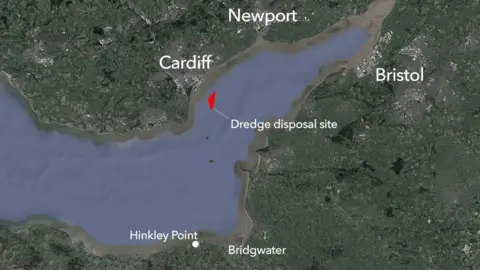Hinkley mud dumping concerns are discussed by AMs
 BBC
BBCPlans to move mud from alongside the Hinkley Point nuclear site in Somerset to a dumping ground off Cardiff Bay have been debated by AMs.
It comes after a petition to the assembly against the plans attracted over 7,000 signatures.
Other online petitions gathered tens of thousands of signatures.
The assembly petitions committee took evidence on the issue and published a summary of the evidence it had heard and requested the debate in the Senedd.
As part of plans to build the new Hinkley Point C nuclear power station in Somerset - 300,000 tonnes needs to be dredged from the seabed nearby.
The developers are set to move it within weeks to a disposal site off Cardiff Bay.
Both developers EDF and Natural Resources Wales insist tests have shown the sediment poses no risk but campaigners claim it could be contaminated by discharges from the old Hinkley Point A and B and argue the mud has not been adequately tested.

The committee's chair, UKIP's David Rowlands, said the report presented the evidence received "with limited commentary" and "without producing substantive conclusions or recommendations".
Labour AM Mike Hedges said the mud samples and data should be made available to "external" experts.
"People would like somebody outside to come and have a look at it", he said.
There should be a "peer review" and Mr Hedges added: "If it is not safe it should not come there".
David Melding, a Conservative, said he was "satisfied that they do meet the standards as set by international law".
"We can have confidence in the licence that has been awarded," he said.

Plaid Cymru's Simon Thomas said the issue illustrated that "we have so little control of our natural resources, that we have to accept the spoil of a nuclear power station in Hinckley Point".
He said that as a matter of principle it is was the Welsh parliament that should decide what happens in Welsh waters.
The company behind Hinkley Point C - EDF - said the mud has been tested independently to internationally accepted standards and shown to pose no risk to human health or the environment.
It has refused a Petitions Committee request to pay for further sampling - arguing claims the mud is toxic are alarmist and wrong, and that any sampling would yield the same results and would not remove the petitioner's objection about the testing process.
Energy Secretary Lesley Griffiths said Natural Resources Wales was satisfied there was no risk from the dredged material to people, the environment, or the wildlife that lives there.
However, she said she has asked NRW to review the way it communicated its decisions over this licence.
 PA
PABefore the debate demonstrators rallied on the steps of the Senedd.
Independent AM Neil McEvoy, who met the demonstrators, dismissed the suggestion the mud had been tested properly and described the situation as a "dereliction of duty".
He said: "We have a Welsh Government allowing Wales to be dumped on and the mud hasn't been tested... The top soil was tested - [but] you've got five samples only under five centimetres for 300,000 tonnes of mud."
Anti-nuclear campaigner Tim Deere Jones, who submitted the petition, is unhappy with the level of testing undertaken.
He said: "What kind of radioactivity is in the mud, how much of it is in the mud, if you dump it into the Cardiff grounds which is a dispersal site - where will it disperse to?"
Richard Bramhall is from the Low Level Radiation Campaign, chairman of the Welsh Anti Nuclear Alliance and a former member of the government advisory committee advising on the radiation effects of internal emitters.
"The idea that the average radioactivity in the mud is at a low level is of no comfort at all to the people of south Wales," he said.
"The particles will blow ashore and once they're in your lungs that's not a low dose."

The petitions committee had heard that the methodology used conservatively assumed a member of the public spends around four hours per day every day on the shore near the Cardiff Grounds and consumes 50 kg of fish and 15 kg of crustacean and molluscs every year, all sourced from near the Cardiff Grounds.
Exposure to the radioactivity in the sediment is also considered from inhaling any sediment that may accumulate on the shore.
In this situation, taking account of the natural and artificial radioactivity together, EDF said the dose received would be equivalent to:
- eating 20 bananas each year (bananas contain potassium-40, a naturally occurring radionuclide)
- 10,000 times less than an airline pilot's annual dose
- 750 times less than the average dose received by a resident of Pembrokeshire (due to Radon)
The company argued that "this is an infinitesimally small level of exposure to radiation, far below the threshold requiring a more detailed assessment or even close to approaching a radiation dose that could impact human health or the environment".
